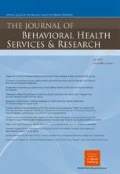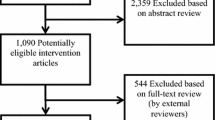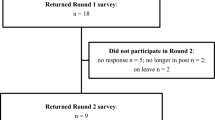Abstract
Research supports the impact of empirically based treatments, such as Parent–Child Interaction Therapy (PCIT), on producing positive treatment outcomes for clients. However, achieving outcomes in community settings that are similar to those found in research settings can be challenging, and little research has been conducted on how to best train community providers to implement PCIT with fidelity. This study assessed trainee implementation fidelity to the PCIT protocol in community settings. Session fidelity was reviewed for trainees using pre-established session integrity checklists and post hoc video review of key sessions. Analyses revealed that trainees maintained strong overall session fidelity, although fidelity percentages varied by session type and treatment phase. Results also highlight those session content items that are frequently left out by trainees during implementation. Implications of these findings, limitations, and future directions for research and PCIT workshops and consultation are discussed.
Similar content being viewed by others
References
American Psychological Association. Policy statement on evidence-based practice. American Psychological Association. Available online at http://www.apa.org/practice/resources/evidence-based-statement.pdf. Accessed June 6, 2011.
Kazdin AE. Evidence-based treatment and practice: New opportunities to bridge clinical research and practice, enhance the knowledge base, and improve patient care. American Psychologist. 2008;63(3):146–159.
President’s New Freedom Commission on Mental Health. Achieving the promise: Transforming mental health care in America. Final report (U.S. DHHS Pub. No. SMA 03–3832). Rockville, MD: U.S. Department of Health & Human Services, 2003.
Spielmans GI, Gatlin ET, McFall JP. The efficacy of evidence-based psychotherapies versus usual care for youths: Controlling confounds in a meta-reanalysis. Psychotherapy Research. 2010;20(2):234–246.
Weisz JR, Jensen-Doss A, Hawley KM. Evidence-based youth psychotherapies versus usual clinical care: A meta-analysis of direct comparisons. American Psychologist. 2006;61(7):671–689.
Hoagwood K, Burns BJ, Kiser L, et al. Evidence-based practice in child and adolescent mental health services. Psychiatric Services. 2001;52(9):1179–1189.
Hoagwood K, Hibbs E, Brent D, et al. Introduction to the special section: Efficacy and effectiveness in studies of child and adolescent psychotherapy. Journal of Consulting and Clinical Psychology. 1995;63(5):683–687.
Southam-Gerow MA, Marder AM, Austin AA. Dissemination of evidence-based manualized treatments for children and families in practice settings. In: Steele RG, Elkin TD, Roberts MC, eds. Handbook of evidence-based therapies for children and adolescents. Springer Science + Business Media, LLC; 2008:447–469.
Weisz JR, Doss AJ, Hawley KM. Youth psychotherapy outcome research: A review and critique of the evidence base. Annual Review of Psychology. 2005;56:337–363.
Eyberg SM, Nelson MM, Boggs SR. Evidence-based psychosocial treatments for children and adolescents with disruptive behavior. Journal of Clinical Child & Adolescent Psychology 2008;37(1):215–237.
Serketich WJ, Dumas JE. The effectiveness of behavioral parent training to modify antisocial behavior in children: A meta-analysis. Behavior Therapy. 1996;27(2):171–186.
Patterson G. Coercive family process. Eugene, OR: Castalia; 1982.
Webster-Stratton C. Predictors of treatment outcome in parent training for conduct disordered children. Behavior Therapy. 1985;16(2):223–243.
Brestan EV, Eyberg SM. Effective psychosocial treatments of conduct-disordered children and adolescents: 29 years, 82 studies, and 5,272 kids. Journal of Clinical Child & Adolescent Psychology. 1998;27(2):180–189.
Lundahl B, Risser HJ, Lovejoy MC. A meta-analysis of parent training: Moderators and follow-up effects. Clinical Psychology Review. 2006;26(1):86–104.
Piquero A, Farrington DP, Welsh B, et al. Effects of early family/parent training programs on antisocial behavior and delinquency. Journal of Experimental Criminology. 2009;5(2):83–120.
McNeil CB, Hembree-Kigin TL. Parent–child interaction therapy. 2nd ed. New York, NY: Springer; 2010.
Eyberg SM, Boggs SR. Parent training for oppositional-defiant preschoolers. In: Schaefer CE, Briesmeister JM, eds. Handbook of parent training: Parents as co-therapists for children's behavior problems. Oxford, England: Wiley; 1989:105–132.
Kazdin AE. Parent management training: Treatment for oppositional, aggressive, and antisocial behavior in children and adolescents. Oxford, England; Oxford University Press, Inc.; 2005.
Shanley JR, Niec LN. Coaching parents to change: The impact of in vivo feedback on parents' acquisition of skills. Journal of Clinical Child & Adolescent Psychology. 2010;39(2):282–287.
Kaminski JW, Valle L, Filene J, et al. A meta-analytic review of components associated with parent training program effectiveness. Journal of Abnormal Child Psychology. 2008;36(4):567–589.
Eyberg SM, Funderburk B, McNeil, C, et al. Training guidelines for parent–child interaction therapy. PCIT International; 2009.
Herschell AD, McNeil CB, Urquiza AJ, et al. Evaluation of a treatment manual and workshops for disseminating, parent–child interaction therapy. Administration and Policy in Mental Health and Mental Health Services Research. 2009;36(1):63–81.
Funderburk BW, Ware LM, Altshuler E, et al. Use and feasibility of telemedicine technology in the dissemination of parent–child interaction therapy. Child Maltreatment. 2008;13(4):377–382.
Pearl E, Thieken L, Olafson E, et al. Effectiveness of community dissemination of parent–child interaction therapy. Psychological Trauma: Theory, Research, Practice, and Policy 2011;4(2):204–213.
Sholomskas DE, Syracuse-Siewert G, Rounsaville BJ, et al. We don't train in vain: A dissemination trial of three strategies of training clinicians in cognitive-behavioral therapy. Journal of Consulting and Clinical Psychology. 2005;73(1):106–115.
Durlak JA, DuPre EP. Implementation matters: A review of research on the influence of implementation on program outcomes and the factors affecting implementation. American Journal of Community Psychology. 2008;41(3):327–350.
Fixsen DL, Blase KA, Naoom SF, et al. Core implementation components. Research on Social Work Practice. 2009;19(5):531–540.
Moncher FJ, Prinz RJ. Treatment fidelity in outcome studies. Clinical Psychology Review. 1991;11(3):247–266.
Mihalic S. The importance of implementation fidelity. Emotional & Behavioral Disorders in Youth. 2004;4:83–86.
Dane AV, Schneider BH. Program integrity in primary and early secondary prevention: Are implementation effects out of control? Clinical Psychology Review. 1998;18(1):23–45.
Schoenwald SK, Sheidow AJ, Chapman JE. Clinical supervision in treatment transport: Effects on adherence and outcomes. Journal of Consulting and Clinical Psychology. 2009;77(3):410–421.
Henggeler SW, Schoenwald SK, Liao JG, et al. Transporting efficacious treatments to field settings: The link between supervisory practices and therapist fidelity in MST programs. Journal of Clinical Child Psychology. 2002;31(2):155–167.
Hayes S. Market-driven treatment development. Behavior Therapist. 1998;21:32–33.
Eyberg SM. Parent–child interaction therapy: Integrity checklists and session materials (version 2.10). Gainesville, FL: University of Florida; 2010.
Bagner DM, Eyberg SM. Parent–child interaction therapy for disruptive behavior in children with mental retardation: A randomized controlled trial. Journal of Clinical Child and Adolescent Psychology. 2007;36(3):418–429.
Werba BE, Eyberg SM, Boggs SR, et al. Predicting outcome in parent–child interaction therapy. Behavior Modification. 2006;30(5):618–646.
Lyon AR, Budd KS. A community mental health implementation of parent–child interaction therapy (PCIT). Journal of Child and Family Studies. 2010;19:654–668.
Eyberg SM, McDiarmid MD, Duke M, et al. Manual for the dyadic parent–child interaction coding system: Third edition. Gainesville, FL: University of Florida; 2004.
Baekeland F, Lundwall L. Dropping out of treatment: A critical review. Psychological Bulletin. 1975;82(5):738–783.
Wierzbicki M, Pekarik G. A meta-analysis of psychotherapy dropout. Professional Psychology: Research and Practice 1993;24(2):190–195.
Eyberg SM, Funderburk B. Parent–child interaction therapy protocol PCIT International; 2011.
Woltmann E, Whitley R, McHugo G, et al. The role of staff turnover in the implementation of evidence-based practices in mental health care. Psychiatric Services. 2008;59(7):732–737.
Niec LN, Eyberg SM, Chase RM. Parent–child interaction therapy: Implementing and sustaining a treatment program for families of young children with disruptive behavior disorders. In: Rubin A, ed. Programs and Interventions for Maltreated Children and Families at Risk. New Jersey: Wiley; 2011:61–69.
Acknowledgments
This work was supported by funds from the Auburn University Psychology Department. The authors wish to thank Shalonda Brooks, Carisa Wilsie, Timothy Thornberry, and Kaitlin Baker for the integral role they played in helping to train these participants in Parent–Child Interaction Therapy (PCIT) and for the time they spent reviewing trainee session videos and completing fidelity checklists. The authors also wish to acknowledge the work of Kathryn Smeraglia, who dedicated countless hours to reviewing session videos to assess their length and content. Any opinions expressed are only the authors’ and do not necessarily represent the views of any affiliated institution.
Conflict of interest statement
This article is not under consideration elsewhere, and the authors have no significant conflicts of interest to report.
Author information
Authors and Affiliations
Corresponding author
Rights and permissions
About this article
Cite this article
Travis, J.K., Brestan-Knight, E. A Pilot Study Examining Trainee Treatment Session Fidelity when Parent–Child Interaction Therapy (PCIT) Is Implemented in Community Settings. J Behav Health Serv Res 40, 342–354 (2013). https://doi.org/10.1007/s11414-013-9326-2
Published:
Issue Date:
DOI: https://doi.org/10.1007/s11414-013-9326-2




